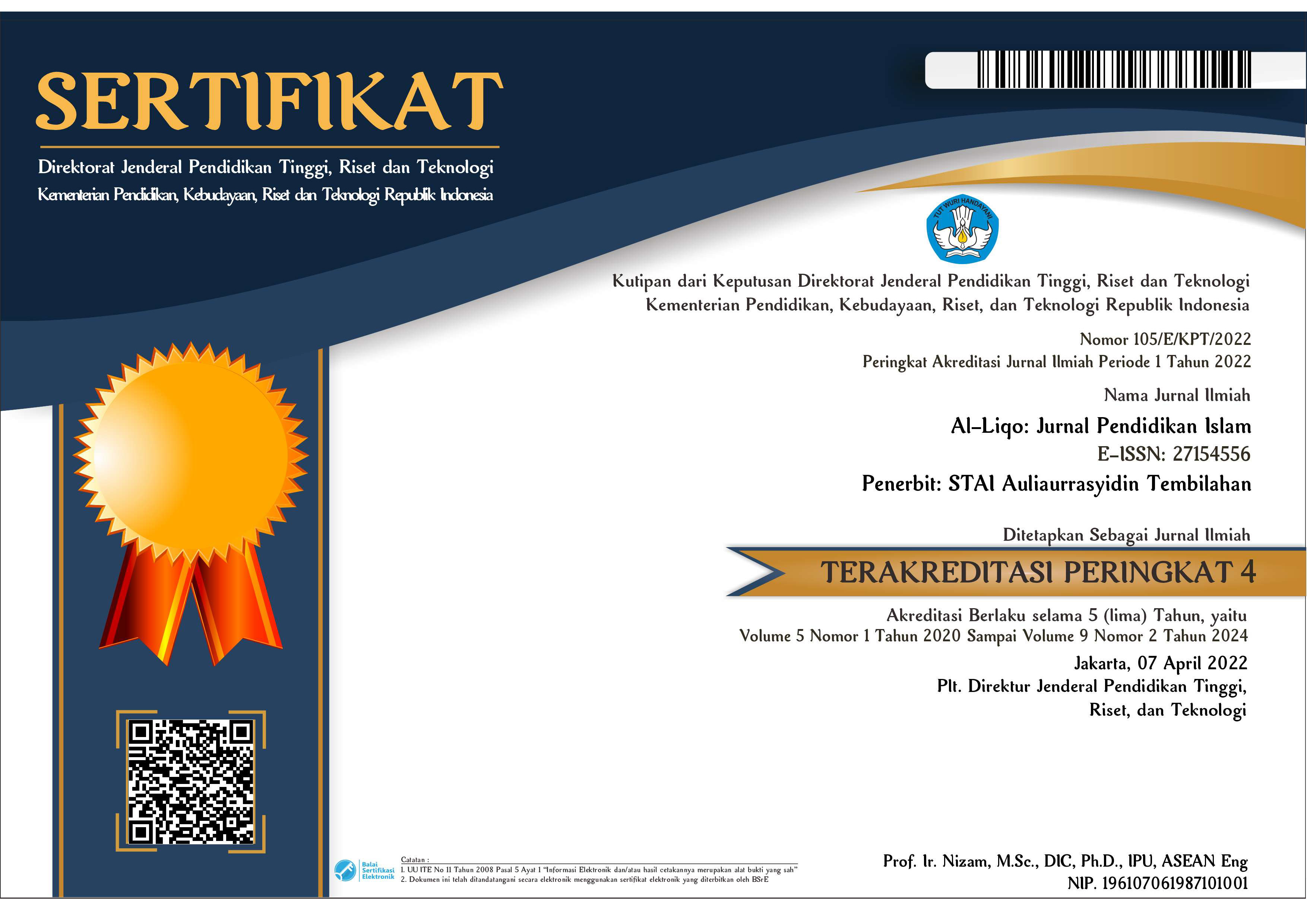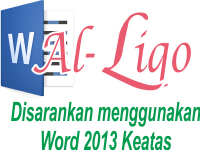The Relevance of Trisentra System to Character Education in the 5.0 Era
DOI:
https://doi.org/10.46963/alliqo.v8i2.841Keywords:
Trisentra System, Character Education, Education in 5.0 EraAbstract
Developing education in Indonesia is one of Ki Hajar Dewantara's missions. The various thoughts he gave brought about the advancement of education in Indonesia. This, coupled with the differences in human thoughts that are considered appropriate for education at a certain place and time, makes Ki Hajar's thoughts on education gradually forgotten. With this paper, the author wants to explain the various thoughts of Ki Hajar Dewantara in character education in the 5.0 era. This research method is qualitative research with a type of literature review with a historical-factual model of the figure, namely the figure of Ki Hajar Dewantara with the object of research being the philosophy of the figure himself. Data collection begins with books related to Ki Hajar Dewantara. The primary data are all books by Ki Hajar Dewantara and supported by secondary data in the form of a history of philosophy, and encyclopedias related to Ki Hajar Dewantara both in terms of the history of his life or his thoughts on education. The results of this research are various pedagogical ideas of Ki Hajar Dewantara which are still important, especially the concept of the Trisentra system in the 5.0 era. Ki Hajar Dewantara's ideas based on character education such as religious values, discipline, honesty, and responsibility, can be used as the basis for the formation of moral education in the 5.0 era.
Downloads
References
Asnawan, A. (2020). Exploring Education Character Thought of Ki Hajar Dewantara and Thomas Lickona. International Journal on Advanced Science, Education, and Religion, 3(3), 164–174. https://doi.org/10.33648/ijoaser.v3i3.83
Bakar, Y. A. (2014). Filsafat Pendidikan Islam. In Inspiratif Pendidikan (Vol. 6, Issue 2).
Bakker, Anton, Zubair, A. C. (1990). Metodologi Penelitian Filsafat. Penerbit Kanisius.
Chai, C. S., & Kong, S.-C. (2017). Professional learning for 21st century education. Journal of Computers in Education, 4(1), 1–4. https://doi.org/10.1007/s40692-016-0069-y
Crain, W., Qudsy, S. Z., & Santoso, Y. (2007). Teori perkembangan : Konsep dan aplikasi (Terjemahan). Pustaka Pelajar.
Dewantara, K. H. (1961). Ki Hajar Dewantara : Bagian I Pendidikan (2nd ed.). Majelis Luhur Tamansiswa.
Dikta. (2020). Pembelajaran Berorientasi Tri Hita Karana Sebagai Upaya Penguatan Kualitas Pendidikan Dasar Pada Abad Ke 21. Pendasi: Jurnal Pendidikan Dasar Indonesia, 4 (1), 126–136. https://ejournal-pasca.undiksha.ac.id/index.php/jurnal_pendas/article/view/3103
Hidayati, N. (2016). Konsep Integrasi Tripusat Pendidikan Terhadap Kemajuan Masyarakat. Edukasia : Jurnal Penelitian Pendidikan Islam, 11(1), 203–224. https://doi.org/10.21043/edukasia.v11i1.811
Higgins, S. (2014). Critical thinking for 21st-century education: A cyber-tooth curriculum? Prospects, 44(4), 559–574. https://doi.org/10.1007/s11125-014-9323-0
Huda, M. (2021). Islamic Philosophy And Ethics Of Education: Al- Zarnūjī’s Concept of Taʻẓīm in his Ta‘līm al-Muta‘allim. Ulumuna Vol., 25(2), 399–421. https://doi.org/https://doi.org/10.20414/ujis.v25i2.464
Jailani, M. S. (2014). Teori Pendidikan Keluarga dan Tanggung Jawab Orang Tua dalam Pendidikan Anak Usia Dini. Nadwa: Jurnal Pendidikan Islam, 8(2), 245–260. https://doi.org/10.21580/nw.2014.8.2.580
Kurniawan, M. I. (2015). Tri Pusat Pendidikan Sebagai Sarana Pendidikan Karakter Anak Sekolah Dasar. Journal Pedagogia, 4(1), 41–49. https://doi.org/https://doi.org/10.21070/pedagogia.v4i1.71
Langgulung, H. (2003). Asas-Asas Pendidikan Islam. Pustaka Al-Husna Baru. https://opac.perpusnas.go.id/DetailOpac.aspx?id=500122
Marwah, S. S., Syafe’i, M., & Sumarna, E. (2018). Relevansi Konsep Pendidikan Menurut Ki Hadjar Dewantara Dengan Pendidikan Islam. TARBAWY: Indonesian Journal of Islamic Education, 5(1), 14–26. https://doi.org/10.17509/t.v5i1.13336
Masturin. (2022). Shaping the Character of insan Kamil: Islamic Education Materials through Character Education during the COVID-19 Pandemic. Edukasia Jurnal Penelitian Pendidikan Islam, 17(2), 187–206. https://doi.org/http://dx.doi.org/10.21043/edukasia.v17i2.14920
Muthoifin, J., & Mutohharun. (2015). Kritis Pemikiran Karakter Dan Budi Pekerti Dalam tinjauan Islam. Profetika, 16(2), 167–180.
Muzakki, H. (2020). Glokalisasi Pendidikan: Studi Atas Revitalisasi Pemikiran Ki Hajar Dewantara. Kodifikasia, 14(1), 43.https://doi.org/10.21154/kodifikasia.v14i1.1906
Nasution, S. (1995). Sosiologi Pendidikan. Bumi Aksara.
Nugroho, P. (2018). Tripusat Pendidikan sebagai Basis Sosialisasi dan Pembentukan Karakter Siswa. Journal of Social Science Teaching, 2(July), 1–23.
Nugroho, P. (2019). Internalization of Tolerance Values in Islamic Education. Nadwa: Jurnal Pendidikan Islam, 12(2), 197–228. https://doi.org/10.21580/nw.2018.12.2.2397
Nurhalita, N., & Hudaidah, H. (2021). Relevansi Pemikiran Pendidikan Ki Hajar Dewantara pada Abad ke 21. Edukatif : Jurnal Ilmu Pendidikan, 3(2), 298–303. https://doi.org/10.31004/edukatif.v3i2.299
Purwadi, Purnomo, E. P. (2005). Kamus Sansekerta Indonesia. Budaya Jawa.
Rusydiyah, E. F., & Matrapi. (2020). Character Education in Indonesian Pesantren. Proceedings of the 1st Raden Intan International Conference on Muslim Societies and Social Sciences (RIICMuSSS 2019), 492(RIICMuSSS 2019), 17–21. https://doi.org/10.2991/assehr.k.201113.004
Samho, B. (2014). Pendidikan Karakter Dalam Kultur Globalisasi : Melintas, 30, 285–302.
Sugiarta, I. M., Mardana, I. B. P., Adiarta, A., & Artanayasa, W. (2019). Filsafat Pendidikan Ki Hajar Dewantara (Tokoh Timur). Jurnal Filsafat Indonesia, 2(3), 124. https://doi.org/10.23887/jfi.v2i3.22187
Sukmawati, H. (2013). Tripusat Pendidikan. Jurnal Pilar, 2(2), 175–194.
Towaf, S. M. (2014). Pendidikan Karakter Pada Matapelajaran Ilmu Pengetahuan Sosial. Jurnal Ilmu Pendidikan, 20(1), 75–85. http://journal.um.ac.id/index.php/jip/article/view/4380
Utami, P. N. (2022). Konsep Pendidikan Karakter Menurut Ki Hajar Dewantara [IAIN Salatiga]. In IAIN Salatiga. https://doi.org/10.33558/turats.v14i2.4466
Wandini, R. R., Syawaludin, M. R., & Koro, M. (2021). Transformasi Dunia Pendidikan Dalam Upaya Percepatan SDM Unggul. In Akademi Pustaka.
Wiryopranoto, S., M. S. Herlina, N., Marihandono, D., Tangkilisan B, Y., & Nasional, T. P. K. (2017). Perjuangan Ki Hajar Dewantara: Dari Politik Ke Pendidikan.
Word Economc Forum. (2015). New Vision for Education Unlocking the Potential of Technology. In www.weforum.org. https://doi.org/10.1063/1.4938795
Downloads
Published
Issue
Section
License
Copyright (c) 2023 Zulkarnain Zulkarnain, M. Yunus Abu Bakar, Ahmad Zakki Fuad

This work is licensed under a Creative Commons Attribution-ShareAlike 4.0 International License.
Authors who publish with this journal agree to the following terms:
1. Copyright on any article is retained by the author(s).
2. The author grants the journal, right of first publication with the work simultaneously licensed under a Creative Commons Attribution shareAlike 4.0 International License that allows others to share the work with an acknowledgment of the work’s authorship and initial publication in this journal.
3. Authors are able to enter into separate, additional contractual arrangements for the non-exclusive distribution of the journal’s published version of the work (e.g., post it to an institutional repository or publish it in a book), with an acknowledgment of its initial publication in this journal.
4. Authors are permitted and encouraged to post their work online (e.g., in institutional repositories or on their website) prior to and during the submission process, as it can lead to productive exchanges, as well as earlier and greater citation of published work.
5. The article and any associated published material is distributed under the Creative Commons Attribution-ShareAlike 4.0 International License







2.png)



